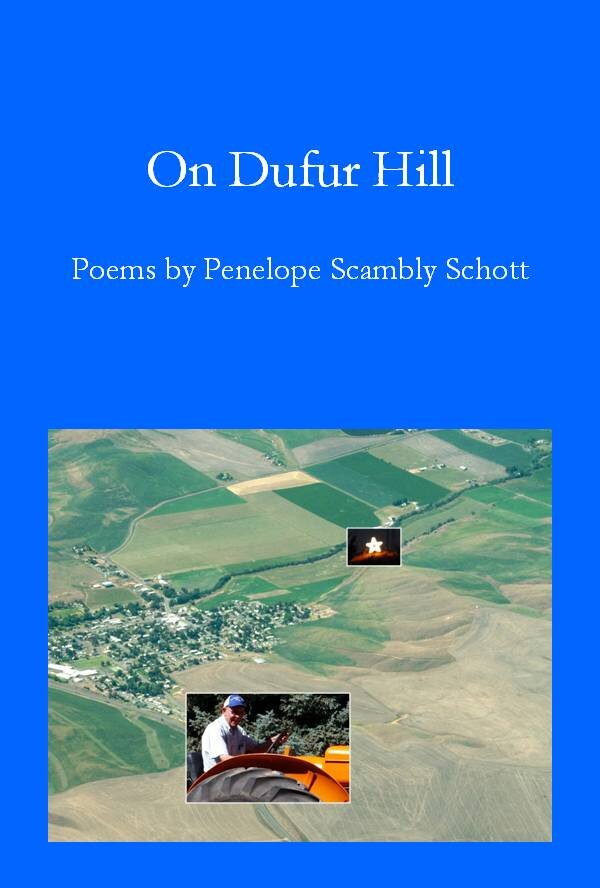"I believe that every person has a true landscape of the soul and that some of us are lucky enough to find that place.”
— Penelope Scambly Schott
Welcome to Fast Five, in which I ask my favorite writers five questions as a way to open the door to know more.
Penelope Scambly Schott is the author of over a dozen poetry books, a novel, and a “slightly fictional canine memoir.” She has earned an Oregon Book Award and numerous other literary achievements. She splits her time between two Oregon towns: the city of Portland to the west, and the small farm town of Dufur to the east.
1.
Let’s start with your most pressing and poetic theme: Dufur, Oregon.
I have a love affair with the small (population: 623) central Oregon town of Dufur. I’ve had my house here for ten years and each year I become more attached to the community. (I’ve bought a plot in the local cemetery so that even though I wasn’t born here I can be dead here.) I’ve published a chapbook called Lovesong for Dufur and, just this spring, On Dufur Hill, a full-length collection of poems about the cycle of a year here.
[ Read excerpts from On Dufur Hill here.]
I believe that every person has a true landscape of the soul — be it beach, mountains, whatever — and that some of us are lucky enough to find that place. I grew up in New York City as a free range child (remember those?) but have never again felt so at home as I do here. When local kids see me walking with my dog Sophia they yell out, “Hi, Penelope,” and when the dog and I step into the post office past the “No Dogs Allowed” sign, Sophia stands up at the counter and Dave or Mike will give her a biscuit.
2.
Why write?
Because I can’t help it? Because when I was a tiny child just learning to speak I stood up in my crib and spoke sentences? Because it’s too lonesome to have words in my mind that I can’t share? I could say that I write, as in putting the words on paper, because, unlike Homer and other bards, my memory isn’t good enough to compose and recite without a crib sheet. And that’s not just a joke; I am obsessed with the sounds of language. Most of my poems originate with a line or two coming into my head as I am out walking, usually climbing Dufur Hill which I do every morning. Something about the rhythm of walking triggers spoken language. I repeat the line or lines all the way down the hill and then when I get home I write them down and continue with the rest of the poem. Maybe writing is my way of coping with noticing and feeling.
3.
Tell us about your professional life. What do you enjoy about teaching?
I got my Ph.D. as a union card. I was a single mother with two kids and I had to do something to feed them. It was only when I started teaching that I discovered I actually liked it. I like: figuring something out clearly enough to explain it, learning from my students, making an emotional connection with each student, hoping I am useful. What I especially like about leading poetry workshops is how quickly we become a community.
On my resume I’ve been a college professor and a workshop leader, but for many years I also had jobs on the side. I worked as an artist’s model which taught me a lot about art and also that a body is just a thing. The most meaningful non-teaching job I’ve had was the five years I worked as a home health aide. I had felt I needed to learn more about old age and dying, and I sure did. Although I was treated with more respect as Professor Schott, I may have been more useful as “the girl from the agency.”
4.
Which non-literary piece of culture — film, tv show, painting, song — has influenced you?
I grew up without a television and never learned to watch. I see very few movies. The songs that have been important to me are not popular music but old Scottish ballads. Perhaps the biggest influence on me was the art I saw as a child when my mother took me regularly to the Museum of Modern Art in Manhattan. I remember being completely freaked out by Picasso’s painting Guernica showing the consequences of war. I can still hear that horse screaming. I was also greatly affected by a Giacometti sculpture called The Palace at 4 a.m. which was full of inexplicable mystery. I think I could trace much of my writing to those two pieces of art.
5.
Is there a book you wish you had written?
When I was a girl that book was Frances Hodgson Burnett’s The Secret Garden for its discovery of the unknown. Now it might be any of the poets who write very short and unforgettable gems — maybe some of the Chinese poets of the Tang dynasty or the wonderful one-line pieces by the Greek poet Yannis Ritsos as translated by my friend Paul Merchant in Monochords.
Bonus Question: What are your favorite words?
Almost anything with a B or a P or a K. I love making those sounds.
Poke, kitchen, spit, slump, noncombustible.
Of course there are also wonderful words like interrogatory and flat.
Hey, I guess I love ‘em all.


